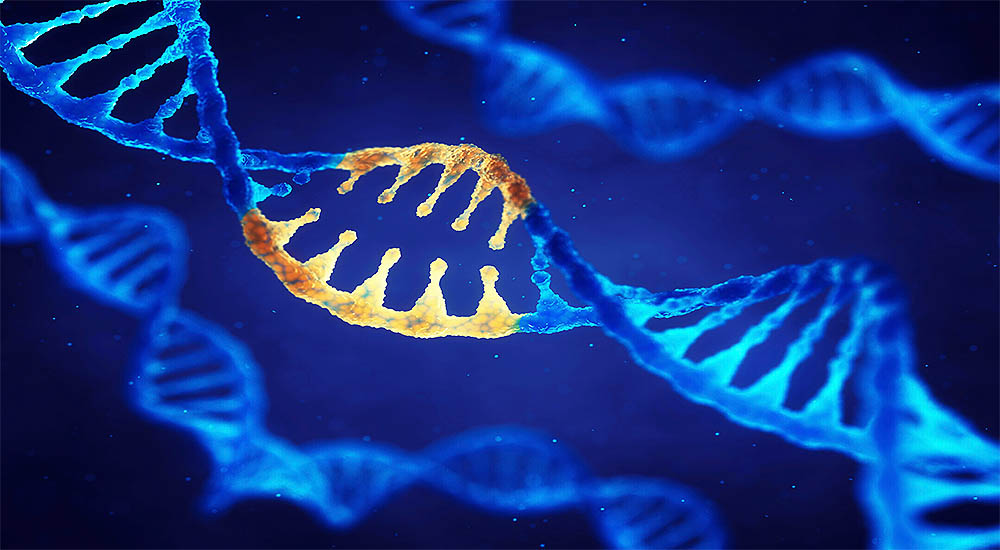Celiac Disease in the Genes

Celiac Disease in the Genes
The Hereditary Links in Celiac & Gluten Sensitivity
Thirty percent of the population carries genes for celiac disease, yet only about 3 percent of people with either gene develop the disease.
Why the large discrepancy? While susceptibility to developing celiac disease is inherited, the disease itself isn’t. Clearly, if the genes themselves were the only factor, 40 percent of us would have celiac disease. It is the interplay of genetics, the environment, and likely other factors that we are still discovering. I would like to suggest that dietary factors, over and above gluten, history of drugs and antibiotics, as well as toxin exposure are likely at play.
When it comes to genetics, there’s an expression that goes like this: your genes load the gun, the environment pulls the trigger.
The risk of developing celiac disease comes from increased variants of certain genes, specifically HLA-DQA1 and HLA-DQB1. These genes provide instructions for making proteins that play an important role in the regulation of your immune system. The variants that are associated with the development of celiac disease are HLA-DQ2 and HLA-DQ8. DQ2 results from certain HLA-DQA1 variants and the HLA-DQ8 results from certain HLA-DQB1 variants.
If an individual possesses neither the DQ2 nor DQ8 genes, their risk of developing the disease is very small; some say impossible, others say less than 1 percent.
The more common gene resulting in celiac disease is HLA-DQ2, but there is no difference in the severity of symptoms with having either DQ2 or DQ8. Those individuals possessing a copy of each gene, DQ2 and DQ8 are more likely to have celiac disease than those who only have DQ8.
When an individual has celiac disease, their child’s overall risk is 5 to 10 percent, a 1 out of 20 or 1 out of 10 incidences, as compared to the general population which is 1 out of 100.
If a parent has one copy of a gene, their offspring has a 50/50 chance of inheriting the gene; if the parent possesses two copies, the child will definitely inherit a celiac gene. Whether they go on to develop the disease is not confirmed but continue reading to gain perspective on these genes and what they might mean for gluten sensitivity.
If you have a first-degree relative with celiac disease, meaning a parent, child, or sibling, you’re estimated to have a 1 in 10 risks of developing celiac disease. That’s 10 times the normal risk.
It’s also important to know that when you’ve been diagnosed with one autoimmune disease, such as celiac, you are three to 10 times more likely to develop others. In particular, celiac disease is highly associated with Hashimoto’s thyroiditis and type 1 diabetes. The prevalence of autoimmune thyroid disease in patients with celiac disease is four times greater than in the general population.
The estimated prevalence of the celiac disease in patients with type 1 diabetes is approximately 6% – 6 times that of the general population. Therefore, you should get tested for the condition if you or anyone in your family has type 1 diabetes.
Is there a genetic link to non-celiac gluten sensitivity (NCGS)?
It took a while for gluten sensitivity to be given credence as a condition. I well remember feeling quite “out on a limb” writing a book in 2007 about gluten sensitivity based on the clinical work we did with our patients. We were completely convinced individuals had severe reactions to gluten when no celiac disease was present.
Shortly after, I met Dr. Alessio Fasano, world-renowned researched celiac disease, who was speaking at Stanford University. I spoke to him after the talk and he explained that he, too, believed in gluten sensitivity.
Two years later, he released his landmark research supporting gluten sensitivity, and I think the world is very glad he did.
Early 2011 at the University of Maryland Dr. Fasano and his team analyzed the genes of those with classic celiac and compared them to those suffering gluten sensitivity.
Their findings were that only 56 percent of the gluten-sensitive patients carried the classic DQ2 or DQ8 genes associated with celiac disease. The conclusion was those genes are far less involved with gluten sensitivity than they are in celiac disease. However, the genes did appear more often in gluten-sensitive patients than in the general population, therefore some role couldn’t be completely ruled out.
In 2012, Dr. Fasano, along with a very prominent group of international celiac disease researchers, published their consensus statement of a proposed method to differentiate between the two conditions, celiac and gluten sensitivity. The clear difference was more on the immune level than on the symptom level where the two conditions actually had a great deal of overlap.
The bottom line: per Dr. Fasano, gluten sensitivity involves only the innate immune system, the ancient part of the immune system involving the first line of defense against invaders. In gluten sensitivity, the innate immune system fights gluten directly and inflammation occurs both inside and outside the digestive system. This explains the “extra-intestinal” symptoms so common in those with gluten sensitivity.
Celiac disease, on the other hand, involves both the innate immune system and the adaptive immune system. The adaptive immune system is more advanced and sophistical. It is miscommunications between adaptive immune system cells that lead to the autoimmune response where your own immune cells attack your body’s tissues. In the case of the celiac disease, this is the destruction of the lining of your small intestine, called villous atrophy.
Since the adaptive immune response is absent in those suffering from gluten sensitivity, that condition is not autoimmune, and despite displaying often identical symptoms to celiac disease, villous atrophy does not occur in those with gluten sensitivity.
Dr. Kenneth Fine, the founder of EnteroLab, an online gluten sensitivity website, believes that everyone with the standard celiac genes, HLA-DQ2, and HLA-DQ8 will suffer from gluten sensitivity.
He doesn’t stop with those genes. Dr. Fine further believes that those with HLA-DQ1 and HLA-DQ3 are also predisposed to NCGS. That means a very small population, those with HLA-DQ4, having immunity to a genetically induced gluten sensitivity. This is genetic “potential” in his opinion, not confirmation of the condition. Environmental factors will dictate whether indeed the condition develops. Those at the highest risk, per Dr. Fine, are those who have two copies of HLA-DQ7.
Dr. Fine’s research hasn’t been replicated. If he’s right, 99 percent of our population would possess the genes that could lead to gluten sensitivity. An interesting thought.
Dr. Fasano, Dr. Fine, and others continue to study gluten sensitivity genetics.
The important takeaway is that even if your or your family member’s celiac gene test is negative, you can still have a problem with gluten.
Have celiac disease? Here are some symptoms to look out for in relatives and children:
Common symptoms in adults:
- Abdominal pain
- Bloating and gas
- Diarrhea
- Fatigue
- Weight loss
- Nausea and vomiting
- Constipation
- Anemia, usually from iron deficiency
- Loss of bone density (osteoporosis) or softening of the bone (osteomalacia)
- Itchy, blistery skin rash (dermatitis herpetiformis)
- Mouth ulcers (canker sores)
- Headaches and fatigue
- Nervous system issues, including numbness and tingling in the feet and hands, problems with balance (ataxia), and cognitive impairment including brain fog, trouble concentrating, depression, or anxiety. Some include ADD/ADHD on this list.
- Joint pain
Common digestive complaints in children:
- Constipation
- Gas
- Nausea and vomiting
- Diarrhea
- Pale, foul-smelling stools
- Swollen belly and discomfort
In children, malabsorption can affect growth and development, so keep an eye out for these symptoms:
- Failure to thrive for infants
- Short stature
- Damage to tooth enamel
- Weight loss
- Anemia
- Irritability
- Delayed puberty
- Headaches
- Seizures
- Neurological symptoms, including ADHD, learning disabilities, or lack of muscle coordination
How to “convince” loved ones to get tested
After 25 years of extensive work in this field, I well know the frustration of trying to convince a loved one to get tested for a gluten reaction. Whether it’s celiac disease or gluten sensitivity, those who have suffered and regained their health by identifying gluten as the culprit, obviously want to help those they care about. And it goes beyond family. My children have correctly “diagnosed” friends by simply observing their symptoms.
There’s no perfect way. Education is everything. Magazines like this one help, plus websites, books, and social media channels can provide data and clarify the effects of gluten.
If you or a family member have celiac and you want to have your children tested, ask your child’s doctor for a blood test if they are a minor. If your child is an adult or if you have relatives who you think are at risk, suggest to them that they ask their doctor for the Wheat Zoomer blood test from Vibrant Wellness. Cyrex Labs is another alternative.
Ultimately, you can only “lead the horse to water” and keep encouraging it to “drink.” You can’t force anyone. Unfortunately, some people must experience enough discomfort in their symptoms or get frustrated enough to seek those answers for themselves. It can also be overwhelming to some. All that means is that you must be incredibly patient, but in the long run, kind persistence tends to be the most successful.
Do you need help with your health?
We have the diagnostic and testing tools, the clinical experience, and a different medical approach to discovering the root cause of why you have the symptoms that are bothering you. As long as you are ready to make some dietary and lifestyle changes, we can help you. We will "hold your hand" through the changes, step by step, to make each step an easy one. We are located in Clearwater, FL, at 1000 S Ft Harrison, at the corner of Ft. Harrison Ave. and Magnolia St. There is plenty of parking space directly accessible from Ft Harrison. If it is not convenient for you to come to Root Cause Medical Clinic, we offer telehealth/telemedicine consultations to residents of certain states. Call us for details.
Contact us for a Consultation – Call 727-335-0400

Dr. Vikki Petersen DC. CCN
Founder of Root Cause Medical Clinic
Certified Functional Medicine Practitioner
Dr Vikki Petersen is a public speaker, author of two books, several eBooks and creates cutting edge content for her YouTube community. Dr Vikki is committed to bringing Root Cause Medicine and its unique approach to restoring health naturally to the world.
Ask a Doctor
Have a health concern you'd like to speak with a doctor about? Or just want clarity on a subject? Ask Us!
Featured Articles
Popular Stories
References:
- https://rarediseases.info.nih.gov/diseases/11998/celiac-disease/cases/43805
- https://rarediseases.info.nih.gov/diseases/11998/celiac-disease/cases/43805#ref_7161
- https://celiac.org/about-celiac-disease/what-is-celiac-disease/
- https://emedicine.medscape.com/article/1790189-overview
- https://www.beyondceliac.org/celiac-disease/related-conditions/thyroid-disease/
- https://emedicine.medscape.com/article/1790189-overview
- https://celiac.org/about-celiac-disease/related-conditions/diabetes-and-celiac-disease/
- [ Fasano et al. Divergence of gut permeability and mucosal immune gene expression in two gluten-associated conditions: celiac disease and gluten sensitivity. BMC Medicine 2011, 9:23.]


